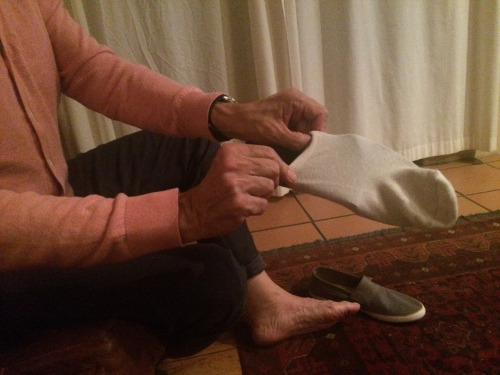Richard Phillips's Blog
January 14, 2016
Fig 1 top - the unacceptable. Fig 2 second from top - halfway...




Fig 1 top - the unacceptable. Fig 2 second from top - halfway to paradise
Fig 3 - third from top. Looking slightly grubby but in position.
Fig 4 - sock not on but in - and entirely invisible
55) How to wear socks with shorts without looking like Jeremy Corbyn.
The time for hypsockrisy is over. I must finally break free from the shackles of chic. Whatever fashion decrees, I can no longer keep up the pretence: yes, it’s true, I hate wearing shoes without socks.
I loathe the feeling as the inner sole of the shoe sticks to the sweaty skin of my bare foot and peels away again. It sounds unpleasant and it is. It sounds unhygienic and I think it must be. It sounds like I should have odour eaters lining my shoes and gulping down the fetid air and I very probably should.
I am sure I am not alone in this revulsion of barefoot shoe wearing. I am certain I speak for millions, nay billions, of men. I believe that many of the very hipsterest of hipsters, the very chaps who blithely pretend that all is well is in their blistered world, secretly feel just as I do. I’ll bet you, yes you, you who cowers at the sight of the fashion police, privately agree with my every word even as you socklessly bestride the streets of Shoreditch.
Admit it: Not wearing socks is a total pain.
But fashion is a cruel and unforgiving mistress. She dictates that one must go sans sock when wearing shorts and she brooks no argument. So what is a world renowned fashionista such of myself to do? Should I accept that I must bear this pain in the cause of beauty? Or should I take my cue from the Corbmeister and his sandals and say it loud and say it proud: sockses and shorts go together like crosses and noughts?
It is a hideous dilemma, because, let’s face it, neither pain nor Jezzawear are remotely satisfactory solutions.
Or rather it was a hideous dilemma. Because necessity, as it always must, has once again become the mother of invention. I have found a solution. Yes, I really have. And now I am ready to share my good news with the world.
It was my flat feet that gave me the idea. My arches long since fallen from the heady heights of youth have to be propped up by orthotics – lovingly moulded to my feet by the delightful Eileen Gemmill at the National Orthapaedic Hospital in Bolsover Street – and these I transfer from shoe to shoe. Shortly I shall explain the crucial role they played.
But, first the context. Yesterday, for the first time, I came to put on my new grey canvas slip-ons – R400 (about £18) in the sale at the Lacoste shop in the Cape Town Waterfront. (In case you were wondering why I am wearing shorts in January, it is because I have temporarily decamped to Sarth Efreeka.) I took them out of their shiny box and carefully inserted my orthotics. And finally, in an attempt to minimise the amount of visible sock, I first slipped around my feet a pair of those specially truncated and elasticated white cotton sockettes that do just about disappear into a pair of Nikes. However, as you can see from Fig 1 above, they stubbornly remain visible above what you might call the plimsoll line of my new Lacoste beach casuals.
For several hours I perambulated thus, bravely trying to ignore the sneers and jibes of passers by, turning my face against their tut-tutting whispers and jabbing fingers, wincing at the wounding remarks of small children – “Mummy, Mummy, why is that man wearing socks with shorts?” - “Avert your eyes Perdita/Channing/Tuppence instantly! You’re too young to understand.”
Eventually, unable to bear the humiliation any longer, I went home and lay down in a darkened room. And there, inspiration came to me. Wait a cotton sockette pickin’ minute I thought, what if - ! I leapt up, pulled off my shoes, ripped out my orthotics, and tore off my sockettes.
Then, I took one of the sockettes and (Fig 2) slipped it not back over my foot, but around one of the orthotics! (For the benefit of future biographers, I believe it was the left.) I then worked the sockette around so the elastic bit tightened and gripped under the sole and the sock part smoothed out across the top of the sole. (Fig 3). Next I carefully put the now besocketted othortic back in the shoe and gingerly, slowly, holding my breath – and communing silently across time with all those legendary originators who have changed the course of world history, feeling just as Hans Lippershey must have done when he lifted the first telescope to his eye, as Logie Baird must have done when he waited to see if the first television signal would really register, as the chap who invented the wheel must have done when he first fitted it to a cart – I put my foot in.
I won’t pretend it was instant success. Just as Logie Baird might have seen a bit of interference on his telly screen before adjusting the signal so I felt a little rucking of the sockette as I attempted to slide my foot over it. But a slight readjustment and – Eureka! My sockless foot rested comfortably inside my shoe, protected from the unsympathetic surface of the orthotic by the prophylactic cotton of the sockette. It was foot next to cotton, cotton next to orthotic – job done!
Bursting with excitement, I then repeated the experiment with the other foot. I stood up, I walked around, I flung open my front door and stepped boldly into the street. I stared straight into the eyes of passers-by. I dared them to sneer at me now. Not so much as the trace of a single snigger. They looked down, they saw my shoes, but, as Nelson might have said, they saw no socks. (Fig 4.)
Three questions will of course be uppermost in your mind.
1. What if your arches still proudly rise and you have no orthotics? Answer: Take out the inner sole from your shoe and wrap your sockette around that. And if the inner sole is disobligingly stuck tight, get a pair of Dr.Scholl (or similar) inner soles, and use those. If these alternatives are not be rigid enough to keep the sockette elastic from bunching them up, I suggest cutting the elastic.
2. What about the other upper bits of the inside of the shoe? Might not they still press and rub against the tops of your feet? Yes, I have to concede that could be a problem with the wrong shoes. But, as ever, half a loafer is better than none.
3. What about flip-flops? No satisfactory answer to that. But every invention has it’s limitations. You can only see so far with even the strongest telescope.
I think that about covers it. As you can’t fail to agree this is probably the greatest advance for humankind since they put wheels onto suitcases. (Sir Tim Berners hit on something useful with the Internet but it pales into insignificance compared with this.)
I look forward to my knighthood, my Legion d’Honeur, my Nobel Prize. And, for having released the human race from the tyranny of this cruel fashion, the call to the White House for the Presidential Medal of Freedom, the citation for which will inevitably be, ‘One small invisibly socked step for a man, one giant leap for mankind.’
January 7, 2016
Veritas, Roman Goddess of Truth, not apparently worshipped by...

Veritas, Roman Goddess of Truth, not apparently worshipped by The Guardian.
54) As they seem to say at The Guardian, never let truth get in the way of a dodgy story.
My
earliest experience of the wanton
disregard that newspapers have
for the truth was when, in about 1977, I was working on the Seat belt campaign
at Y&R. (Y&R, short for Young and Rubicam, that’s an advertising agency
to the uninitiated.) For some reason, now long forgotten, I was phoned by the
Daily Express to discuss the new commercials we were making – the first that
had been done without Jimmy Savile. (Yes, amazing to think that he was once
regarded as the safe, sober, avuncular
voice of reason who might persuade you to do the sensible thing. And, actually,
he was rather good at it. But that’s another story – that, being in an almost
unimaginable past, is another country.)
“So”
asked, the voice at the other end, “are you the chap who wrote the ‘Clunk,
click, every trip’ line.”
“NO!”
I said, vehemently denying I had anything to do with it. Not because I didn’t
think it was any good – if it wasn’t exactly poetry it was undeniably
memorable, which is, after all, the first job of any advertising line - but because I did not want to be seen to
be laying claim to something I had not
done. That would have been regarded as a court martial offence, and a capital
one at that, in the Y&R bar. Just in case my new friend in Fleet Street –
in 1977 he probably really was in Fleet Street - had misheard me, I was at
pains to repeat my denial. “No, absolutely not, I did not write it.”
Sure
enough, in the next day’s Express, there I was: Richard Phillips, the man who
had written the famous line, ‘Clunk click, every trip.’
Since
then I have had, I suppose, first hand knowledge of about a dozen stories that have appeared in
the press, and every one – and I really do mean every single one – has got key
facts wrong. Each and every one was, to a greater or lesser extent, downright
misleading.
And
yet, still I continue to be a voracious reader of newspapers and, even more
incredibly, choose to believe what is
written in them, even while simultaneously
believing - knowing – that nine tenths of it, probably ten, is utter
bollocks.
Strange
indeed. I can only try to explain this bizarre behaviour that flies in the face
of all reason by suggesting I like reading newspapers and I am interested in
the sorts of things they write about – sport, politics, current affairs – and
that it would leave a hole in my life if I didn’t spend time – several hours a
week I am sure – reading them. If I properly
accepted, as I should, that they are not to be believed then I would have to
further accept that this was a
completely pointless exercise and find
something else, probably even more pointless, to fill the time.
So,
as so often in life, common sense loses out and on I go, soaking up the
fantasies as if they were the facts they are claimed to be.
However,
just recently a couple of big stories have caught my eye which I could just not
let pass without a bit of further investigation.
One
was the story of the ‘Tory party bullies, which I wrote about in post 51. If you
can be bothered, please have another look at it. You will see that, with
even the tiniest amount of drllling down – to use Evan Davies favourite phrase – it becomes quite clear
that The Guardian was making claims that even their own ‘evidence’, when properly examined,
showed were completely inaccurate. Nor, in the case of this story, has The
Guardian been alone.
A
short while after these unsubstantiated Guardian allegations, the BBC, ran a story one evening on ‘Newsnight’ (editor: Ian Katz, formerly of The Guardian) and again on Radio 4’s ‘Today’ the following morning, about a
file that had been submitted to Conservative Central Office in 2011 purportedly
containing multiple allegations of bullying.
Yet no
effort was apparently made to see if this file existed. On the ‘Today’ programme they added a telling
footnote saying that the BBC had not, in fact, seen the file, which, though an
extraordinary admission of dereliction of duty, at least had the benefit of
honesty and was something they had signally failed to mention during the ‘Newsnight’
coverage.
Just
think: the BBC, supposedly the most unimpeachable source of journalistic truth
in the world, ran an incendiary story, implicitly supporting the claim that the
Chairman of the Conservative Party had so completely ignored his duty of care
to his employees that his inaction led
ultimately to the suicide of one of them, without bothering to make sure that the file, this ‘smoking gun’, actually
existed.
Surely
the first thing any half decent
journalist would do, when
presented with the news of the existence of this file, would be to
ask if a copy had been kept and then to ask to see it, to check if the
claims were true. And if this journalist was told that for some
unfathomable reason, no copy had been kept or if he was denied access if it had,
would he not have thought, ‘Do you know what, I smell a bit of a rat here and
maybe I shouldn’t go throwing all this mud around until I have some firmer
evidence.’
As I
have said in my previous post, I have absolutely no idea what the truth of this
Tory bullying story is, but I do know that a lot of wild accusations have been
chucked around by The Guardian and the BBC backed up by supposed evidence that
doesn’t stand thirty seconds of even the mildest forensic examination. Quite why this might be the case, I know not
– although I suspect - and I freely admit that I have sucked this theory out of
my thumb - that there might be people on the political left making common cause
with some within the Conservative party (my enemy’s enemy etc.) who wish to
damage David Cameron and that they see
an attack on his supposedly close
friend, the Chairman of the Conservative Party, Lord Feldman, as being a jolly
good way of getting at him.
But
my quarter baked conspiracy theories are bye the bye. What I am on about here
is the inaccuracy/carelessness/dissembling of the press and in particular, The
Guardian, since it is always on its high horse about the need to expose the
truth and to defend civil liberties and
generally presents itself as,
well, the guardian, of all that is right and proper.
Surely,
The Guardian above all other British newspapers
has a moral duty to show some
scruples about the stories it prints.
Yet
it continued not to concern itself with scruples when it launched attack after
attack on the Government over its handing
on the flooding crisis of recent weeks.
As Storm
Frank swamped Yorkshire, the Guardian ran this headline:
‘Government warned
about funding cuts weeks before Yorkshire floods.’
It expanded on this idea in the first paragraph:
'The government was warned by its own
advisory body that a funding gap could leave swathes of the north vulnerable to
flooding just weeks before the deluge this Christmas, official documents show.’
Official documents!!!
There
it was - another smoking gun. And as it turned out one that bore a
remarkable similarity to our previous smoking gun, in that its bullet
chamber turned out to be equally
empty. In the second paragraph came the name and words of the man behind
this
supposed warning, ‘Prof Colin Mellors, head of the Yorkshire regional flood and coastal
committee (RFCC), said ‘funding cuts could mean discontinuing some flood
defences, according to minutes on the government’s website.’
Hm. That quote from Prof. Mellors didn’t seem to me to mean
quite the same as 'leav(ing) swathes of the north vulnerable to flooding’. Clearly someone at The Grauniad had made, what
might be charitably called, a leap of
the imagination. But still, they thoughtfully provided us with the link to the
government website, so we could look for ourselves.
So I did look for myself and what I found was a 140 page
document - the minutes of a meeting chaired by the aforementioned Prof. Mellors.
I can’t say I could bring myself to read
this stultifyingly dull document in detail - I would be amazed if anyone could
stay awake long enough - but I did scan it twice looking for any of these
words, and, as far as I can see, neither 'swathes
of the north’ nor even 'funding cuts
could mean discontinuing some flood defences ’ appeared anywhere.
Being rather baffled, I wrote in the Comments section underneath the article much of what I
have written above, and added:
‘Now possibly,
these exact words from Prof Mellor are buried somewhere in the text, and I
missed them - if anyone else can be bothered to wade through the 140 pages and
they find them, please let me know - but sure a hell, they are not triple
underlined or have even the slightest prominence. If this was a 'warning’ it
was certainly at the extremely mild end of the warnings spectrum.’
Someone called Billy Mansell – presumably another saddo like me
with nothing better to do than spout off in the Comments section – replied
thus:
Took less than a
minute to find the section (2.9).
Now I’m sure some
deniers will continue to quibble that the exact wording of the papers is not as
the article but the intent is clear from Prof. Mellors’ words.
And I, in turn, looked up section 2.9 in the minutes and then
posted this reply to Billy Mansell:
‘Item 2.9 is this as far as I can see. 'With ever
tightening budgets, it is clear that there will need to be even firmer
prioritisation, especially in relation to maintenance activity and it is likely
that the Asset Maintenance Protocol (agreed by RFCCs in 2011) means that we will
be asked in the New Year to consider sites where maintenance might be formally
discontinued. Some RFCCs have already started to consider and implement such
possibilities and it is obviously important that such difficult decisions are
based both on proper risk assessments and reflect local choices. It is
important that the region itself makes such choices.’
Are you seriously
telling me, (I asked of Billy Mansell),
that the Guardian’s precis is an accurate reflection of this?’
I won’t pretend that I was able to persuade Billy Mansell of my
point of view but I think anyone with the least objectivity – not a type
commonly found amongst Guardian comments contributors, admittedly – would have
to agree that The Guardian headline and article were a gross distortion of the
facts on which the story was supposedly based.
And The Guardian wasn’t done yet with spurious attacks on the
government about the flooding
A couple of days later, it ran this headline:
Experts
criticise George Osborne over flood protection funding
And the article underneath began as
follows:
George Osborne
has been accused of
jeopardising Britain’s crumbling flood defences over the past five years by
prioritising cuts to the deficit, and has also been warned that infrastructure
spending may need to rise sharply to adapt to climate change.
The warnings from leading academics came as parts of
the UK were hit by
Storm Frank
on Wednesday, with hundreds of
homes evacuated and thousands of people left without power.
Professor Simon Wren-Lewis, of Oxford University,
who has analysed data on recent flood spending, said there was little sign that
the government had changed course to take into account the growing threat of
extreme weather.
“What you would really expect is to see spending at
a much higher level,” he said. “It doesn’t seem like the same kind of reaction
which we know has happened to the threat of terrorism, where we know spending
levels have increased by a large magnitude.”
Fair enough you might think. Very newsworthy. Not quite experts in the
plural as the headline claims but still, a professor from Oxford – must know
what he is talking about.
However, once again, all was not quite what it seemed.
Buried further down in the article – in paragraph 8 – which, I
suspect, is probably a bit further than
most readers usually get, was this revealing littile detail. 'Wren-Lewis, who
sits on the Shadow Chancellors panel of Economic Advisors …’
Ah. Quel surprise.
Perhaps not the impartial academic one might have thought him to be (or rather ‘they’ as the headline claims) but possibly someone with a teensy weensy
bit of a political axe to grind. The
Finacial Times has said of this panel: ‘Mr.McDonnell’s seven economists are
unified in their opposition to Mr.Osborne’s spending cuts.’
For your further instruction here is
the full list of the McDonnell panellists.
1.
David
Blanchflower, who calls himself a “Tory-baiting Ivy League economist”
2. Mariana Mazzucato, who said, “Look
at the few countries that have achieved smart, innovation-led growth, you’ve
had this massive government involvement” She formerly advised discredited
motor bike loving Greek finance minister, Yanis Varoufakis, in the Syriza
government.
3. Anastasia Nesvetailova who has said “The
paradigm that governed…private market actors and society for the past few
decades will have to be rethought.”
4.Ann Pettifor, a former adviser to
Ken Livingstone
5.Thomas Piketty, French best selling author who Evan Davies and Paul Mason
swoon over, and whose starting point on the panel is to “expose austerity for the failure it has been in the UK and Europe”.
6.Joseph Stiglitz Winner of the 2001 economics Nobel Prize, and another adviser to the Greek (Syriza)
finance ministry and, for good measure, the SNP
7. And finally, Simon Wren-Lewis himself, who claims that, “Among economists with expertise, there is a clear majority view
that fiscal austerity is significantly contractionary”
One has to say that none of the quotes attributed to
Mr.McDonnell’s panellists are very surprising in that they are all very much in
Mandy Rice Davies territory: Well they would say that wouldn’t they?
But what alarms me is that, as we have seen from both the
bullying and the flooding stories, the Guardian is just as predictable. They
too would say that wouldn’t they.
And clearly they would say it whether or not it was true.
The Guardian, whose every editorial reeks of self
righteousness, whose columnists, Polly Toynbee, Owen Jones et al, never
fail to
claim the moral high ground, seems to have no more conscience about
bending the truth around hairpin corners than the Sun or
the Star.
Is the government guilty as charged over the flooding?
Haven’t a clue. Neither have I about the truth of the bullying allegations at Conservative Central Office. But I do know this: I am not likely
to discover the facts of either matter from The
Guardian.
.
December 24, 2015
People witnessing the Winter Solstice. Fools. It’s the day...

People witnessing the Winter Solstice. Fools. It’s the day after they should be celebrating.
53) Merry DAWSmas to you and yours. (Merry Day After the Winter Solstice.)
Dickens was wrong.
Scrooge really wasn’t all that bothered about Christmas. At least, not when compared with me. Compared with the vitriolic, visceral, unremitting loathing that I have for Christmas, Scrooge was pretty much take it or leave it. Even accounting for the much freer use of expletives that you find today, I can, when contemplating Christmas, and indeed, on many occasions have, come out with something a good deal saltier than ‘Bah, humbug’.
I might have liked Christmas once, when it meant waking up at half past four in the morning, desperate to be the first person in my bedroom to get his hands on the new Beano Annual. But frankly, once you’re past your units, the pull of Desperate Dan does start to wane. There was, when my daughter Hannah was little, some joy to be had in watching her shred the wrapping that, the night before, had taken me hours to lovingly construct around her Barbie Dolls and Beanie Babies. Yes, of course, there was joy. Mixed in with a certain horrified fascination. It was like watching a shoal of piranha strip the flesh from a human limb – only in double time.
The big problem with Christmas for me has always been my birthday. That comes on January 3rd. As a child I was convinced I was being short changed because no-one was going to give me a decent birthday present when they’d just lashed out for Christmas. “It seemed silly to get you two ordinary presents so we’ve got you one big, special, combined present for Christmas and your birthday.” Yes, thank you Auntie Vera and Uncle Joe, thank you very much. Like I’m really buying that.
And then, as you get older, probably when you hit 40, certainly when you get past 50, it’s hard to think of a birthday as being much more than a staging post to oblivion. No, the only people over the age of 10 whom I can imagine getting anything out of birthdays are those two American sisters who wrote “Happy Birthday to You” and were until very recently still getting royalties for it. (It’s true, I promise you.)
One other anniversary of misery to mention: more or less half-way between Christmas and my birthday, comes New Year’s Eve, an occasion which I have never once, after well over fifty – alright sixty - goes at it, managed to even remotely enjoy. The pointless build-up (5…4…3…2…1 - why are we bothering for God’s sake? After 2000 plus years we must know what’s coming by now), the dismal anti-climax, the embarrassed ‘Happy New Years’ to strangers whose happiness or otherwise could hardly mean less to me, the forced jollity at which I’ve always been particularly hopeless – do you know, on reflection, I actually think I prefer my birthday.
And if all that – the unholy trinity of Christmas, New Year, birthday - weren’t bad enough, there are the short, dismal, sunless days of midwinter to deal with. I simply hate, hate, hate getting up in the dark.
That’s why my favourite day of the year is December 22nd – the day after the winter solstice, the first day when the days start getting longer again. Except that this year the winter solstice did not take place on December 21st as I thought we were always taught at school, but on December 22nd. So this year December 22nd is not my favourite day of the year after all, but my fifth least favourite day of the year – after Christmas, New Year and my birthday and the winter solstice itself.
Apparently - I think I have this right now – the winter solstice can occur on either the 21st or the 22nd. (It all depends on something or other but I’m not sure what.) According to the Daily Telegraph, this year’s winter solstice took place on on Tuesday December 22nd at 04:49 GMT (Universal time) with the sun rising over Stonehenge at 08:04.
Personally I couldn’t give a toss about what time the sun rises over Stonehenge. It’s what time it rises over Queens Park that I care about, and the earlier the better. And I care even more about what time the sun sets over Queens Park – the later the better. (Fuck the Scottish farmers is what I say – why should we have to put our clocks back just to please a few Jock sheepshaggers who can’t wait to declare independence and make us have Trident on our side of the border. But I think I may be digressing a bit here.)
So it turns out that this year December 23rd is my favourite day of the year.
This may surprise you. You may be thinking, surely June 21st – or possibly the 22nd – which is, of course, the date of the summer solstice and the longest day of the year – would be my favourite day of the year? But you’d be wrong. And the reason you’d be wrong is that you’re not thinking it through.
You see after June 21st or 22nd comes the day after the summer solstice which is the day the days start getting shorter again, and I really cannot bear the thought of that. In fact the day after the summer solstice, June 22nd or 23rd – whichever - is my sixth least favourite day of the year. And the certain knowledge that it is coming the next day casts such a long depressing shadow over the day before – the day of the summer solstice on June 21st or, as I think we have firmly established by now, possibly June 22nd – means that it could never be a favourite either.
If I am being completely honest, I start to get depressed about the shortening days on the day after the spring equinox which is on March 21st (or presumably the 22nd). That, as you will know, is the half way point between the winter and summer solstices. The reason the black dogs start barking that day – and this can seem a bit complicated so bear with me – is that it marks the point at which there are fewer days to go to the day when the days start getting shorter again than have passed since the day when they started getting longer. (The day after the winter solstice.) It’s like having five roast potatoes on your plate. The joy is not so much eating them as having them to look forward to. With each one you eat, there is one less to look forward to. And once you pass the half way point – three – you begin to contemplate staring into the abyss, the moment when you have no roast potatoes on your plate at all.
Actually, the roast potato analogy only works so far. Because to avoid staring into the abyss, you could just take a sixth roast potato or if they have all been served up, suddenly shout out, ‘Oh look, isn’t that David Beckham over there!’, and while the person sitting next to you is suddenly distracted, steal a roast potato off his plate. (Although if you did do that, you’d probably have to immediately shove the whole thing in your mouth to stop them from noticing and taking it back, and it could be very hot and you could find yourself having to toss it around the inside of your mouth with your tongue to avoid being burnt and then possibly swallow it whole which could give you horrible indigestion and the prospect of all of that is hardly something to look forward to.)
Even so, at least options like these might be available in the roast potato scenario whereas the shortest day of the year thing is a done deal, and there is two tenths of fuck all you can do about it.
Except you could emigrate I suppose.
But then you’d just have the shortest day of the year somewhere else. (Even if you went to live somewhere bang on the equator, where, I believe, the hours of sunlight are exactly the same length every day. As a matter of fact, that would be the worst possible place to go. Not only would it be bloody borinig but every day would be the shortest day of the year and that wouldn’t do at all.)
So, anyway, as I have been saying, this year December 23rd is* my favourite day of the year, and rather than wish everyone a Merry Christmas, a day which I think I may have mentioned that I hate, I have elected to do something completely different. Doesn’t it make so much more sense to wish people merriment on a day which makes you, yourself, merry rather than on a day you want to shoot yourself?
Merry Day After the Winter Solstice is a bit of a mouthful I’ll grant you, but once you just use the acronym, it’s rather jolly.
‘We wish you a Merry Dawsmas,
We wish you a Merry Dawsmas,
We Wish You A Merry Dawsmas,
and a Happy New Year.’
Shit. Forgot about that last bit, still there’s no specific refrerence to New Years Eve so I think we can let it pass.
*You may have noticed that, sadly, I have managed - or, rather, mismanaged - and not for the first time - to miss my deadline.
Hope your Day After The Winter Solstice was as merry as mine.
December 7, 2015
Top to bottom: Tomer Hemed, Hilary Benn, Brittany...




Top to bottom: Tomer Hemed, Hilary Benn, Brittany Howard, Jessie Buckley. Wow, wow, wow and wow!
52) 'It's Magic!'
A few years ago, before I had a blog that nobody reads, I had a radio programme that nobody listened to. One Saturday evening, at the height of my radio career – turn of phrase only, listeners probably required to claim any actual heights - I happened to watch a TV programme called ‘I’d Do Anything’, a sort of talent show in which Andrew Lloyd Webber was looking for an unknown girl to play Nancy in a forthcoming West End production of ‘Oliver’. On this particular evening an 18 year old Irish girl called Jessie Buckley sang a song called ‘The Man That Got Away.’
Somehow I had never heard this song. I say ‘somehow’ because I have since discovered that it’s been recorded by a gazillion different singers including Ella Fitzgerald, Barbra Streisand, and Judy Garland who set the benchmark with the original version in the 1952 film, ‘A Star is Born.’ I think you could describe ‘The Man That Got Away’ as the ultimate torch song - the story of a woman still carrying a torch for a man who walked out on her and left her in despair. In other words, the story of a woman who has lived.
If it had been translated into French, ‘L’homme Qui Parti’ would have been ideal for Edith Piaf. In fact, I’m astonished that didn’t happen because with its insistent rhythm and the tragic lament of the lyrics, Piaf’s been-round-the-block-a-few-times sound and style would have fitted it perfectly.
But, as I say, Jessie was only 18 when she sang it, and, with her curly hair and fresh open face, quite a young looking 18 at that. And yet, despite what should have been a total mismatch between song and singer, her performance was utterly electrifying. I have since heard lots of different versions and, in my totally uninformed opinion, none, not Ella’s, not Barbra’s, not even Judy Garland’s, has been as poignant and riveting as Jessie’s. She seemed to live the song as she sang it, completely inhabiting it, and I wasn’t the only one who was spellbound. If you look at the recording on Youtube - and I promise you won’t regret it if you do - at https://www.youtube.com/watch?v=prmfyYlNBYQ - you will see a cutaway to Lloyd Webber barely able to contain himself.
Jessie didn’t win the public vote to be Nancy despite the fact that Lloyd Webber and his co-producer Cameron Mackintosh were clearly totally convinced that she should have got the part.
But, lucky, lucky girl, she did get interviewed by me on my listener-free radio show.
And after the interview I asked her if she would help out in a little charity project I was involved in, and being a thoroughly charming and well brought up girl from the west of Ireland up she couldn’t quite find the words to decline, so she did indeed get manoeuvred into helping out. And during the helping out, I also met her mother, the equally charming Marina, a singer and a harpist, who was in London for the day. (The relevance of this will eventually become apparent if galloping narcolepsy hasn’t overtaken you by then.)
This connection gave me a sort of ridiculous semi-proprietorial interest in Jessie and her career, and a few months later I went to see her when Trevor Nunn cast her in Sondheim’s ‘A Little Night Music’ at the Meuniere Theatre. As it happens, another person of my acquaintance, Maureen Lipman, was also in the cast, so my sense of having a link to Jessie was reinforced. And then Jessie, who had, I believe, twice been turned down by drama schools in Ireland – which only goes to show you what utter pillocks people can be - decided she needed formal theatrical training and was offered a place at RADA which she took up.
I thought she had made a brave but wrong decision – not, of course, that she would ever have dreamed of asking me what I thought. But having seen the judges’ reaction to her on ‘I’d Do Anything’ it seemed to me that she was already on the radar of the biggest names in musical theatre and sooner or later - and probably sooner - Lloyd Webber or Mackintosh or some other big hitter would give her something pretty juicy. Her talent was blindingly obvious so why go to a drama school – even one as prestigious as RADA – and put yourself back amongst the unknowns?
Which only goes to show you – or, if you know me, to reinforce your already unshakeable conviction – that I know absolutely sod all. Because Jessie has now emerged from drama school and, having already appeared last year opposite Jude Law in ‘Henry V’ (or ‘Harry the Vee’ as Sid James once called it), she has now been cast by Kenneth Branagh as Perdita in his new West End Production of ‘The Winters Tale’ also featuring himself and Judi Dench. As Shakespeare himself once probably didn’t say, not a bad gig to get.
Keen students of the bard will have spotted that these are not singing roles and although Jessie has apparently occasionally emerged to do a bit of chanteusing in jazz clubs and such like, it seems the singing has taken something of back seat; rather unfortunately I would have said, since she is so unbelievably good at it.
To bring the story right up to date: On Saturday afternoon, whilst watching Brighton – Brighton and Hove Albion - beat Charlton 3-2 (having coming back from 2-0 down) to remain top of the Championship and unbeaten since the season began - come on you Seagulls! - but I digress - I received a text from Maureen Lipman, who, despite holding me responsible for ruining her career, has remained a friend for the nearly 30 years we have known each other. She was inviting me to join some people for dinner.
Unfortunately I was in the grip of the game at the time – Alb-i-un, Alb-i-un, Alb-i-uh-un! - and so missed the beep that would have alerted me to the text’s arrival, and, in point of fact, didn’t notice it until Sunday, when I rang up Maureen to explain my failure to reply. At which point , she revealed - somewhat sheepishly I couldn’t help thinking – that she was that very night going to see Jessie sing at ‘The Crazy Coqs’, a little club in Soho. ‘Sheepishly’ because, as she and I have discussed Jessie’s brilliance before, she knew very well that I am a major fan but she also knew that the performance was completely sold out. In other words she was telling me that she was going, but the best I could hope for was to do as Tiny Tim did in ‘A Christmas Carol’– it’s seasonal so I thought I’d throw it in – and press my nose forlornly against the cold window from the outside and accept the fact that I was excluded.
But I am a resourceful fellow. Enter Jessie’s mother. (Are you still awake?) Hm, I thought, I still have her number, why not call Marina to see if she can call Jessie and ask her if she can get me a ticket? A little cheeky you might think, particularly since we haven’t spoken for a good few years and then only on the day of the charity thingie. And yes, I would have to concede that to call it ‘a ittle cheeky’ would not be unjust – in fact, more like a serious understatement.
But what’s a bit of a cheek between friends? Even if we’d only met once and not for years. So I called the number I still had for Marina in Ireland, and, would you believe it, she answered and, after a little prompting, remembered me – or claimed to - and didn’t put the phone down immediately – so maybe she didn’t - and agreed to get a message to Jessie in London.
A few minutes later I received a text from her dutiful daughter telling me there would be a ticket for me on the door.
And so last night, I went to see Jessie, now 26 I think, in what I was told was her first singing gig for a couple of years.
This is a copy of the text I sent to Marina on my way home afterwards.
‘My goodness, Marina, Jessie was absolutely stunning. Beyond good, beyond just about anything. That was THE place to be tonight. Everyone was on their feet clapping furiously and cheering at the end. She was bloody magnificent. And if this sounds like the ravings of a star struck fan that is because that is exactly what I am. Thank you so, so much for helping get in. It was an absolute privilege to be there and quite literally unforgettable.’
And truly it was all of that. Accompanied by a terrific trio of piano – played by her musical director, the brilliant Joe, a virtuoso in his own right - guitar and bass, Jessie Buckley gave us a show that everyone lucky enough to have been in that room will, I have not the slightest doubt, be talking about for years to come. Singing classics from the American songbook, sometimes in a jazz mode, sometimes more straightforwardly, she quite simply pinned the audience to their seats from first to last.
Jessie has a voice which, when sotto voce, is pure silk, and when full-on leaves you – but not her, because she never seems to run out of breath – gasping. So much in her repertoire was simply wonderful that it seems almost invidious to rank one song above another, but ‘The Trolley Song’ with which she opened and ‘The Man That Got Away’, her encore piece – of course - seem to be top of mind, or rather they would be except that now I am remembering her glorious version of ‘It’s Magic’ and the amazing ‘Summertime’ medley.
But best of all, I think, was one song which, sitting very still, she sang very quietly, accompanied only by a guitar and which, I am not embarrassed to say, had me choking back tears. It was Don McLean’s ‘Vincent’, a truly great song anyway, but sung as you’ve never heard it. As my daughter would say, OMG. OMG to the power of ten, of a hundred, of a thousand.
Am I getting carried away like some silly schoolboy in a way totally unbefitting to a man of my too many years? Yes, of course I am, but so would you if you’d been there.
And the thing above all that marks Jessie out as being truly special is that she has that amazing gift of seeming to completely abandon herself in the moment. I’ve written in an earlier post on this blog about my infatuation with ‘Alabama Shakes’, the band that I went to Paris to see two days before the Bataclan murders. Their singer, Brittany Howard, who is a very similar age, has the same thing, albeit in a completely different genre. Brittany seems to me to be part Aretha Franklin and part Janis Joplin. With Jessie and her style of singing, it’s more Judy Garland I suppose or Liza Minelli as she was in Cabaret, though she sounds very different from either. But both, to me, had that completely uninhibited, putting-it-all-out-there genuineness, and that’s what Jessie gives you. And on top of that, a great charm and a winning smile and a total command of the stage. It’s a heady mixture.
To all you Tiny Tims out there I say this: should you ever hear that Jessie Buckley is going to be singing in a venue somewhere near you, it’s going to be sold out in minutes because Jessie is going to be stratospheric some day very, very soon. But do not accept that you have to stand outside, pressing your nose against the window. Break the bank, mug a tout, call Jessie’s mother – do whatever it takes, but one way or another, find a way to get a ticket and go.
And so finally to Hilary Benn, which may seem like a bit of stretch but in a way, daft as it may sound, it isn’t at all.
Because just as I was completely captivated and electrified by Jessie so I was as I stood transfixed in front of my telly watching Hilary Benn’s soon to be legendary speech in the Commons about the Syria bombings. Seeing that speech, having the sense that I was watching something quite exceptional, being entirely caught up with it, being thrilled by the power of it, the poetry of it, the rise and fall, the drama, was not so different from how I felt watching Jessie or Brittany Howard. (Oh, I know what you’re thinking – not very seemly to be that thrilled by a speech about bombing. But the truth is I was. That’s the power and the danger of great rhetoric I suppose.)
And neither was it so different from the way I felt when Tomer Hemed, Brighton’s Israeli striker, headed the 85th minute winning goal against Charlton. There and then, in that moment, when Brittany Howard screamed, when Jessie Buckley soared, when Hilary Benn stabbed the dispatch box with his finger and spat out, ‘Con – tempt!’ – when the ball hit the back of the net and twenty five thousand people rose as one in the glorious realisation that we’d only fucking gone and won, I felt totally caught up, immersed, exhilarated, alive.
Not quite getting it across am I? Well, you had to be there I suppose. But that’s the point. You had to be there. And I was.
November 29, 2015
Mark Clarke: Today’s unpopular cause

Mark Clarke: Today’s unpopular cause
51) Would being shouted at really drive a man to suicide?
Some years ago, a friend of mine, Phil Cherrington, committed suicide. It was a shock, not least because apart from being a friend, he was a work colleague, and, in HR speak, I was his line manager. To be more specific, in the argot of the advertising world of the 80s, Phil was a copywriter and I the head of the creative group in which he worked. Not long before he put a plastic bag over his head - that sounds brutal but that kind of thing is - I had very clumsily remonstrated with Phil about a piece of work that he was doing but which didn’t, in my not very humble opinion, reach my lofty standards. I had known Phil for several years before we worked together, even been on a sailing holiday with him, and I knew he was prone to depression. I was clumsy with my admonition to say the least.
A week or so later, after the funeral service, his father came up to me and told me not to worry, it wasn’t my fault.
It was especially kind of him because he must have been absolutely devastated and I appreciated the thought. But he really needn’t have bothered, because not for a moment did I think - and I still don’t - that anything I had said or done was the fundamental cause of Phil taking his life. It is conceivable I suppose that my feeble impersonation of ‘the hairdryer’ had been the straw that broke the camel’s back. But camel’s backs are normally pretty strong and fortified by a hump or two and don’t break under the weight of a single straw unless they are already on the very point of disintegration.
Of course, one never knows the precise state of someone’s mental fragility - and although I knew Phil to be a depressive I don’t think I ever seriously thought he was going to kill himself - so it is always wise to be cautious and temperate lest one runs the risk of being the heavy hand that pushes someone over the edge. But, as I’ve already said in different words, that someone must have already got themselves so unsafely close to the edge that one unwitting shove - which in normal circumstances would be met with a shrug of the shoulders or two fingers or a shove back - can send them off to oblivion. Life is too precious to any healthy balanced adult for them to chuck it away just because some unthinking tosser is nasty to them.
Which brings me to the strange story of Mark Clarke - the Tory party former activist whom, we are invited to infer, drove a younger Tory activist, to take his own life.
The thrust of this story seems to be that Mark Clarke’s actions, in and of themselves, are responsible for this young man’s death. Frankly, I just don’t buy that and that I think it is quite wrong for the Guardian and the BBC who both seem to be doing their damnedest to make this story fly, to allow such an inference to be drawn. I feel incredibly sorry for the young man’s father but should Newnight be giving him a platform for making his charges? In his lengthy interview on Friday night, Emily Maitlis, normally a forensic interrogator, made not the slightest serious attempt to ask if there might have been any other contributing factors to his son’s suicide,which, basic common sense tells you, there must have been.
In the cause of pushing this line (even if it isn’t their avowed aim, that is the effect) The Guardian ran a headline yesterday, Saturday November 28th, which was downright untrue.
It said:
Lady Warsi letter warning Tory party chair Grant Shapps of bullying by aide.
But the letter which was printed underneath does NOT do anything of the sort. If you find it hard to believe that The Guardian would be so sloppy or mendacious as to do something so misleading, here is a link to an article which has a reproduction of the letter in full:
The first thing to say about Baroness Warsi’s letter is that it is not, principally, a complaint about Mark Clarke. It begins,
“I am writing in relation to the conduct of Alan Burton, the chairman of the Dewsbury Constituency Chairman.”
The background is this: Baroness Warsi resigned as Communities Minister in protest at what she claimed was David Cameron’s 'morally indefensible’ failure to condemn the suffering in Gaza. Then at a speech in Huddersfield she upset Alan Burton, who happens to be Jewish. (As - co-incidentally? - Lord Feldman and Grant Shapps are.) Mr. Burton was so incensed by what he heard that, as was reported at the time, he decided ‘to walk out just minutes into Baroness Warsi’s speech. After the high-profile event, Mr Burton expressed his anger on Facebook.He wrote: “Just listened to Sayeeda Warsi speech at Itrat Ali’s event which turned into a diatribe against Israel and a pro-Hamas speech.Walked out in disgust, never again will I speak to her.” ‘
Baroness Warsi’s motive in writing the letter seems chiefly to defend herself against the charge of anti-Semitism. Mark Clarke is only a secondary target of her ire. His sin was to Tweet the following:
“Baroness Warsi is now slagging off the Jewish Party Chairman of her old seat of Dewsbury who was upset by her speech.”
Nowhere in the letter does she does make any charge about Mark Clarke being a bully. She does claim that she received a number of abusive messages following the Tweet, but not from Mark Clarke. The inference is merely that his Tweet, and Alan Burton’s Facebook comments provoked this response.
It may be indeed have been very unwise of Mark Clarke to have so Tweeted but Baroness Warsi’s letter most certainly does not make the charges the Guardian headline explicitly claims it does. And where in the letter does it say, as the Guardian claims in the same article that ‘Warsi felt Clarke’s wrath when he attempted to troll her on Twitter’?
How on earth does this single Tweet amount to Trolling or ‘abuse’, by any conceivable definition of the terms, as the Guardian article explicitly claims?
For all I know Mark Clarke is the not-very-nice-chap that all this sound and fury implies. I hold no particular brief for him. But there is nothing so odious as the whiff of injustice no matter who the accused is. And it seems totally unfair to be flinging all this mud around on the basis of what, so far, doesn’t seem to amount to anything very substantial. I would hazard a completely uninformed guess that what is really driving this is an agenda to damage the Conservatives and in particular David Cameron - who we are constantly told is a close personal friend of Lord Feldman - by association
This now seems to have succeeded because Grant Shapps has resigned his ministerial position, accepting responsibility for the ‘scandal’ since he was Party Chairman at the time.
I hold no particular brief for Grant Shapps, any more than I do for Mark Clarke, but I wonder if he has not been sacrificed by Tory high command because the tide of this story, whatever the rights and wrongs, was simply overwhelming them and they felt some public gesture had to be made. And Grant Shapps, an easy and frequent target of the press, was no great sacrifice to make. (On the basis that chucking meat to sharks only encourages their bloodlust, this will very likely prove to be a silly mistake, and serve them right.)
I do not deny for a moment that there are charges against Mark Clarke which must obviously be investigated – the bizarre blackmail business connected to another young man, for one. And the fact that he has been banned from Tory Party for life does suggest that there is fire connected to all this smoke. Yet, when you look, what does it all really add up to?
Take this blackmail charge: In case you don’t know what that is about, here is more from The Guardian;
“ Among the allegations levelled at Clarke – it is understood more than 25 complainants have approached CCHQ – was a serious one of blackmail made by a Tory activist, who has spoken to the Guardian.
The 20-year-old, who wishes to remain anonymous, made a complaint to the party about Clarke’s behaviour after he allegedly pinned the man’s girlfriend to the wall during a Road Trip 2015 night out.
Three months later, the activist was befriended on Facebook by a French woman who quickly contacted him on Skype, stripped in front of him and persuaded him to perform a sex act. Soon afterwards he received a demand via Skype for €3,500 (£2,500) and was told that if he didn’t pay it the film would be posted on Facebook.
The demand was received four days after he went to CCHQ to give evidence against Clarke. “I was pretty distraught,” he told the Guardian. “Pretty annoyed at myself for letting it happen to me. It was a rough day.”
So, three months after the young man’s girlfriend was allegedly pinned to a wall by Clarke he is contacted by a woman on Facebook who then persuades him to commit a sex act on Skype.
Aren’t there a few questions that The Guardian might have asked before reporting this story. For instance:
a) What is the evidence that Clarke had any connection to this persuasive woman? The Guardian makes no mention of any that I have seen.
b) What evidence is there that the blackmail attempt had anything to do with Clarke? Again, The Guardian offer none.
Mark Clarke, we are faithfully reminded during all of these reports, denies all the charges. But then, are we are not always told that, in every case, of whatever kind, but only after after we have been left in no doubt that what we are really supposed to think is, as one correspondent wrote in The Guardian comments section yesterday, ‘Well he would say that, wouldn’t he?’



